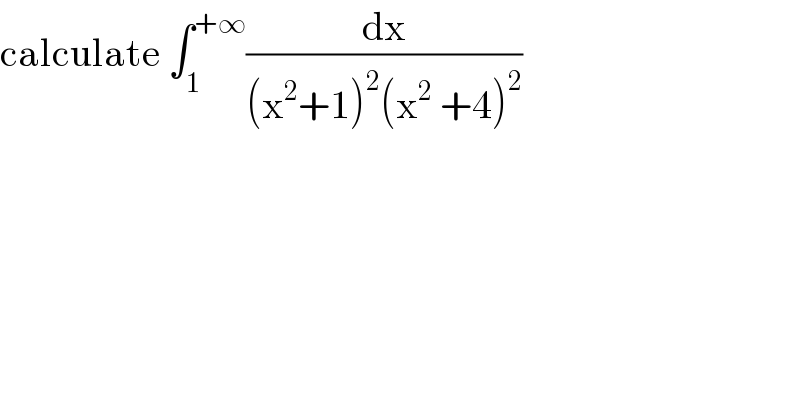Question Number 105230 by mathmax by abdo last updated on 27/Jul/20

Answered by 1549442205PVT last updated on 27/Jul/20
![F=∫[(1/4)((1/x^2 )−(1/(x^2 +4)))]^2 dx 16F=∫[(1/x^4 )+(1/((x^2 +4)^2 ))−(2/(x^2 (x^2 +4)))]dx =∫(dx/x^4 )+∫((1/(2(x^2 +4)))−(1/(2x^2 )))dx+∫ (dx/((x^2 +4)^2 )) =−(1/(3x^3 ))+(1/(2x))+(1/2)×(1/2)tan^(−1) ((x/2))+I_2 =−(1/(3x^3 ))+(1/(2x))+(1/4)tan^(−1) ((x/2))+(1/(2.4)).(x/((x^2 +4)))+(1/4).(1/2).(1/2)tan^(−1) ((x/2)) =−(1/(3x^3 ))+(1/(2x))+(x/(8(x^2 +4)))+(5/(16))tan^(−1) ((x/2)) F=(1/(16)){−(1/(3x^3 ))+(1/(2x))+(x/(8(x^2 +4)))+(5/(16))tan^(−1) ((x/2))} I= ∫_1 ^(+∞) (dx/((x^2 +1)^2 (x^2 +4)^2 ))=F(+∞)−F(1) =(1/(16)){(5/(16))×(𝛑/2)−[((23)/(120))+(5/(16))tan^(−1) ((1/2))]}](https://www.tinkutara.com/question/Q105339.png)
Commented by abdomsup last updated on 28/Jul/20

Commented by 1549442205PVT last updated on 28/Jul/20

Answered by mathmax by abdo last updated on 29/Jul/20
![I =∫_1 ^(+∞) (dx/((x^2 +1)^2 (x^2 +4)^2 )) we have F(x)= (1/((x^2 +1)^2 (x^2 +4)^2 )) =(1/9)((1/(x^2 +1))−(1/(x^2 +4)))^2 =(1/9){ (1/((x^2 +1)^2 )) −(2/((x^2 +1)(x^2 +4))) +(1/((x^2 +4)^2 ))} ⇒ 9F(x) =(1/((x^2 +1)^2 )) −(2/3)((1/(x^2 +1))−(1/(x^2 +4)))+(1/((x^2 +4)^2 )) =(1/((x^2 +1)^2 ))−(2/(3(x^2 +1))) +(2/(3(x^2 +4))) +(1/((x^2 +4)^2 )) ⇒ 9 ∫_1 ^∞ F(x) =∫_1 ^∞ (dx/((1+x^2 )^2 ))−(2/3)∫_1 ^∞ (dx/(1+x^2 )) +(2/3)∫_1 ^∞ (dx/(x^2 +4)) +∫_1 ^∞ (dx/((x^2 +4)^2 )) we have ∫_1 ^∞ (dx/((1+x^2 )^2 )) =_(x=tant) ∫_(π/4) ^(π/2) (((1+tan^2 t))/((1+tan^2 t)^2 ))dt =∫_(π/4) ^(π/2) cos^2 t dt =(1/2)∫_(π/4) ^(π/2) (1+cos(2t))dt =(π/8) +(1/4)[sin(2t)]_(π/4) ^(π/2) =(π/8) −(1/4) and ∫_1 ^∞ (dx/(1+x^2 )) =[arctanx]_1 ^∞ =(π/2)−(π/4) =(π/4) ∫_1 ^∞ (dx/(x^2 +4)) =_(x=2t) ∫_(1/2) ^∞ ((2dt)/(4(1+t^2 ))) =(1/2)((π/2)−arctan((1/2))) =(π/4) −(1/2)((π/2)−arctan2) =((arctan2)/2) ∫_1 ^∞ (dx/((x^2 +4)^2 )) =_(x=2t) ∫_(1/2) ^∞ ((2dt)/(16(t^2 +1)^2 )) =(1/8) ∫_(1/2) ^∞ (dt/((1+t^2 )^2 )) =_(t=tanu) (1/8) ∫_(arctan((1/2))) ^(π/2) ((1+tan^2 u)/((1+tan^2 u)^2 ))du =(1/8)∫_(arctan((1/2))) ^(π/2) ((1+cos(2u))/2) du =(1/(16))∫_(arctan((1/2))) ^(π/2) (1+cos(2u)du =(1/(16))((π/2)−arctan((1/2)))+(1/(32))[sin(2u)]_(...) ^(...) =((arctan2)/(16)) +(1/(32))(−sin(2arctan((1/2))) so the value of I is known](https://www.tinkutara.com/question/Q105445.png)
